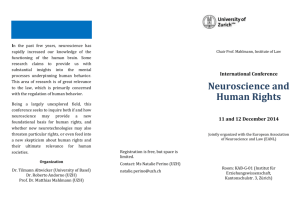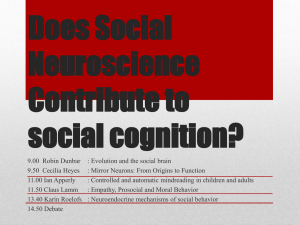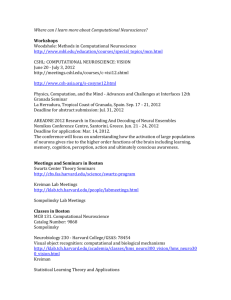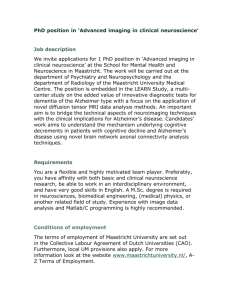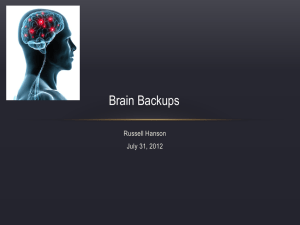here - Melbourne Neuroscience Institute
advertisement
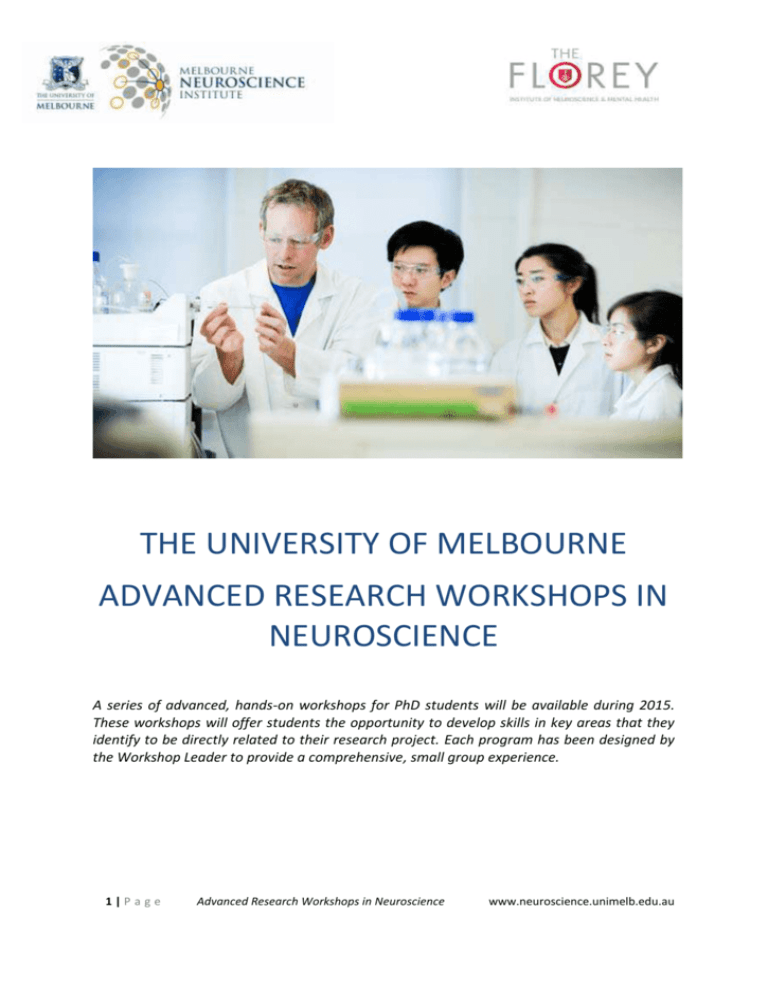
THE UNIVERSITY OF MELBOURNE ADVANCED RESEARCH WORKSHOPS IN NEUROSCIENCE A series of advanced, hands-on workshops for PhD students will be available during 2015. These workshops will offer students the opportunity to develop skills in key areas that they identify to be directly related to their research project. Each program has been designed by the Workshop Leader to provide a comprehensive, small group experience. 1|P a g e Advanced Research Workshops in Neuroscience www.neuroscience.unimelb.edu.au Program There are 6 workshop programs offered in 2015. These are detailed within this document. WORKSHOP Magnetic Resonance Imaging WORKSHOP LEADER Professor Roger Ordidge Human Pluripotent Stem Cells in Neuroscience Research Professor Martin Pera Fundamentals of Ion Channel Function in the Brain: Associate Professor Steve Petrou Intracellular and Extracellular Recordings Fundamentals and Future of Advanced Live Cell Imaging Associate Professor Andrew Metha Advanced Workshop in Human Genetics Introduction to Bioinformatics for Neuroscientists Associate Professor Justin Rubio Dr Victoria Perreau There is no cost to attend the workshop programs. Application Process The timeline for the application process is as follows: Applications Open: Friday 6 March 2015 Applications Close: Friday 18 April 2015 Successful Applicants Notified: Monday 18 May 2015 Very limited places are offered for each workshop program. Expressions of Interest are to be submitted on the form provided, together with your CV, by COB Friday 18 April 2014. Please send your EOI and CV to the following email address: research-mni@unimelb.edu.au For any enquiries, please email: research-mni@unimelb.edu.au Melbourne Neuroscience Institute For further information about the Melbourne Neuroscience Institute, please visit our website: www.neuroscience.unimelb.edu.au 2|P a g e Advanced Research Workshops in Neuroscience www.neuroscience.unimelb.edu.au Advanced Workshop in Magnetic Resonance Imaging The aim of this workshop program is to educate students in the principles of MRI, the design of the MRI scanners and use of contrast to distinguish between abnormal and normal tissue. The focus will be on imaging the brain. A scanner will be used to explore MRI contrast differences between various liquid samples. It is envisaged that this course will provide a solid foundation in MRI for current PhD students involved with MRI research. Presenters: Professor Roger Ordidge and Dr Brad Moffat. Workshop format: 18 hours total. Topics to be covered in a series of one-hour lectures (3 per week) will include: o Classical description of Nuclear Magnetic Resonance o Excitation of the MR signal by resonance o Spin relaxation behaviour: T1 and T2 Spectroscopy o MR signal detection and processing o MR image formation o MRI hardware o Spin-echoes, gradient-echoes and production of image contrast o Understanding MR sequences using K-space o Echo-Planar Imaging, artefacts, and MR safety o Fast imaging using FLASH, contrast agents o Flow and angiography o Diffusion- and perfusion-weighted imaging and functional MRI. Two one-hour tutorials covering multiple choice questions discussed as a group. Hands-on demonstration of T1, T2 and Diffusion measurement in liquid samples (2 hours). Analysis of T1, T2 and Diffusion parameters from acquired data (2 hours). Proposed timeframe: August to Sept 2015, over 6 weeks, up to 3 hours per week. Prerequisites: VCE qualification in secondary maths, physics or chemistry (or all). Professor Roger Ordidge 3|P a g e Advanced Research Workshops in Neuroscience www.neuroscience.unimelb.edu.au Advanced Workshop: Human Pluripotent Stem Cells in Neuroscience Research The aim of this workshop program is to familiarise participants with the application of human pluripotent stem cells to problems in neuroscience, including the study of brain development, functional genomics, and disease modelling. Presenters: Professor Martin Pera and Dr Anna Michalska. Workshop format: 28 hours total. 6 x 1 hour tutorials 2 x 1 hour literature review 4 x 5 hour workshops including: o Pluripotent stem cell propagation, maintenance and characterisation o Stem cell genetic manipulation and differentiation o Functional investigation of differentiated cells. Pre-Reading will be provided to students. Professor Martin Pera Proposed timeframe: 1 – 4 September 2015 Prerequisites: Tissue culture experience 4|P a g e Advanced Research Workshops in Neuroscience www.neuroscience.unimelb.edu.au Advanced Workshop: Fundamentals of Ion Channel Function in the Brain: Intracellular and Extracellular Recordings This program will introduce students to theory, methods and approaches for the expression and analysis of ion channels using two electrode voltage clamp and extracellular fields using multielectrode arrays. This program will cover: Theoretical lectures on “counting ion channels” and source of extracellular currents Whole cell electrophysiology using automated two electrode voltage clamp recording in Xenopus oocytes Analysis of cultured neuronal networks using multi-electrode arrays. Presenters: Associate Professor Steven Petrou and Dr Chris Reid. Workshop format: 36 hours total. 2 x 6 hour theoretical workshops 3 x 8 hour practical sessions Pre-Reading will be provided to students. Proposed timeframe: July 2015 Associate Professor Steven Petrou Prerequisites: Interest in biophysics and electrophysiology. A basic knowledge of electricity from high school or first year physics would be help students get the most out of the course. This workshop is limited to 6 students. Priority will be given to students who wish to apply this knowledge to their PhD studies. 5|P a g e Advanced Research Workshops in Neuroscience www.neuroscience.unimelb.edu.au Advanced Workshop: Fundamentals and Future of Advanced Live Cell Imaging The ability to visualise the minutiae of biological structures has underpinned our knowledge about plants and animals. New methods continue to evolve, pushing beyond the diffraction limits imposed by the physical nature of light itself, to increase the microscope’s scientific prowess. In a mixture of tutorials and hands-on workshops, workshop participants will be introduced to the theory and practicalities of advancing microscopy techniques that allow cellular-level resolution, invivo and super-resolution of in-vitro biological samples. The program will cover: Imaging of live human retinal cells using adaptive optics: View your own photoreceptors and make movies of individual red blood cells as they course through your capillaries 3D Structured Illumination Microscopy (3D-SIM): Sample illumination techniques, combined with point fluorescence and image processing Localization microscopy techniques: photo-activated localization microscopy (PALM) and stochastic optical reconstruction microscopy (STORM). Photo-switchable proteins embedding in samples are exploited such that the locations of single molecules within a cell can be determined During the course of the workshop, the potential for hybrids of these methodologies will be emphasised. Workshop participants will become cognisant of emerging technologies to improve spatial resolution of live-cell imaging while keeping tissue/cells viable, and gain valuable hands-on experience as they discover the limitations, and future possibilities, of these techniques. Pre-reading material will be provided well in advance of the program. Presenters: Associate Professor Andrew Metha and Dr Paul McMillan. Workshop format: 17 hours total 2 x 4 hour tutorials (round-table format). 3 x 3 hour hands-on workshop sessions with equipment for each of the above techniques. Pre-Reading will be provided to students. Proposed timeframe: October – November 2015. Prerequisites: None Associate Professor Andrew Metha 6|P a g e Advanced Research Workshops in Neuroscience www.neuroscience.unimelb.edu.au Advanced Workshop: Human Genetics The aim of this workshop is to educate students in the principles of human genetics and to illustrate how it can be leveraged to reveal fundamental aspects of disease biology and translated into clinical application. With a mixture of tutorials, wet- and dry-lab practical sessions, it is envisaged that this workshop will equip students with knowledge that can be applied to their own projects and research endeavours. The workshop will focus on: • Genetics and human disease – gene mapping and statistical interpretation • Techniques in human genetics – genotyping, DNA sequencing and gene expression analysis • Genomic databases – SNPs, GWAS and regulatory information • Integrative genomics and systems biology – concepts and analytical techniques • Translational genomics – applications in drug development, precision medicine, genetic risk prediction and diagnostics Presenters: Associate Professor Justin Rubio and Dr Michael Inouye Associate Professor Justin Rubio Workshop format: 22 hours total 5 x 2 hour tutorials (round table format) 3 x 4 hour practical sessions. Pre-Reading will be provided to students. Proposed timeframe: October 2015. Prerequisites: This workshop will assume a basic knowledge of human genetics and/or bioinformatics to undergraduate level. 7|P a g e Advanced Research Workshops in Neuroscience www.neuroscience.unimelb.edu.au Advanced Workshop: Introduction to Bioinformatics for Neuroscientists Bioinformatics is a diverse field and this course will provide an intensive introduction to selected basic analysis methods and data types commonly used in bioinformatics, with a particular focus on neurosciences. The course is aimed at bench researchers with no programming skills. A selection of tools and databases useful for researchers in the Neurosciences will be demonstrated during the workshop. Topics proposed are listed below, however the topics may be changed at the request of the group: SNPs, genotyping and disease Protein sequence alignment, domains and motifs Using the Allen brain atlases Expression analysis using microarrays and RNAseq Finding and analysing experiments in Gene Expression Omnibus Co expression analysis of on line data using Gemma Analysis of complex traits and phenotypes in GeneNetwork Protein Interactions and networks The course is structured to include defined tutorials using example data. However, students will also be supported at an individual level to apply analysis skills to their own research questions of interest and encouraged to present their findings to the group at the end of the course. Presenters: Dr Victoria Perreau, Bioinformatics core manager and Dr Noel Faux and Dr Andrew Fox Workshop format: 20 hours total contact time in 10 weekly 2 hour small group workshops. Additional 20 hours (minimum) outside workshop hours, for completing workshop activities and individual support. Dr Victoria Perreau Total 40 hours commitment. 8|P a g e Advanced Research Workshops in Neuroscience www.neuroscience.unimelb.edu.au All software used in the workshop is freely available and instructions for downloading and installing will be provided where necessary. Proposed timeframe: Course commencement will be between June and September 2015, actual dates are to be decided. Prerequisites: A good understanding of molecular biology, including gene structure, transcription and translation is essential. Applicants who articulate a biological question, relevant to their research area, that they think might be approached from a bioinformatics stand point will be preferred. This is because the student’s own research interests will be used as examples in tutorials wherever possible and students will be expected to present their own analyses to the group at the conclusion of the workshop. Familiarity with using genome browsers and the types of data used in genome browsers is required. It will not be covered by the course. Tutorials for genome browsers are available on line: UCSC genome browser: http://www.openhelix.com/ucsc Ensembl genome browser: http://www.ensembl.org/info/website/tutorials/index.html 9|P a g e Advanced Research Workshops in Neuroscience www.neuroscience.unimelb.edu.au
